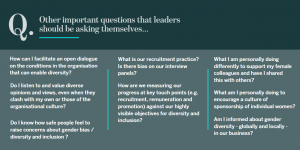In celebration and support of International Women’s Day 2021, we wanted to share the personal and professional views of our colleagues, clients and contacts on diversity and inclusion.
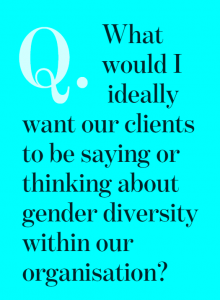
The initiatives of many organisations are to be applauded – clear diversity targets, focused recruitment practices, unconscious bias training, individual development programmes for women, including mentoring, sponsorship and coaching. Progress is in hand but alongside all of these initiatives, leaders have the most important role to play. They set the standard for the culture and behaviours that should be adopted across the organisation so that diversity, equality and inclusion becomes a fundamental way of working.
“A challenged world is an alert world,” say the organisers of the International Women’s Day, who are asking us to “raise our hands” in support of #IWD2021. “Individually, we’re all responsible for our own thoughts and actions – all day, every day. We can choose to challenge and call out gender bias and inequity. We can choose to seek out and celebrate women’s achievements. Collectively, we can all help create an inclusive world. From challenge comes change, so let’s all choose to challenge.”
Our contributors have shared their responses to a specific area as well as posing some questions that leaders need to consider as part of their diversity and inclusion effort.
Jenny McConnell
HPC Senior Facilitator and Executive Coach
& Lean In Newry Leadership Team Member
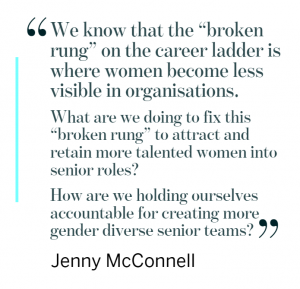
Q: In what everyday ways can we help to overcome the barriers that hold women back?
Be an ally at work. Raise your hand to endorse a woman’s contributions publicly, invite her to speak at a meeting, recommend her for a stretch assignment. As a leader at Lean In Newry, I work with a fantastic team that is dedicated to helping women achieve their ambitions. However, to create a more inclusive workplace, we must all raise our hands, especially in those micro-moments at work. From challenge comes change.
Jenny is pictured in the header image above.
Sean Fitzpatrick
Director Human Resources, John Sisk & Son Ltd
 Q: In your opinion, what are the top priorities when it comes to challenging and advancing gender equality at an organisational level?
Q: In your opinion, what are the top priorities when it comes to challenging and advancing gender equality at an organisational level?
I think that the first thing we need to challenge is ourselves – are we aware of the impact of our words and actions, and more importantly, what are we doing about it? Gender equality isn’t something owned by the Board or by the Executive team – we all own it and we have a responsibility to ensure that we continue to work towards it. As well as being conscious of our words and actions and their impact on others, we need to be brave and call out inappropriate behaviours where we see them, regardless of the situation or the people involved.
We need to challenge our hiring and promotion
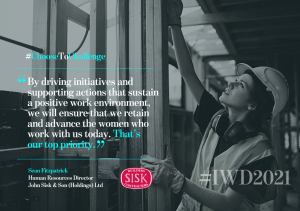
processes and how we allocate work and how we appoint people to various roles across the company. We need to work hard so that there are role models across our company so that women can see a role model and ‘someone like me’, and that they can get to the most senior roles in the company.
All of these challenges contribute to ensuring that our work environment is welcoming and inclusive to all. By driving initiatives and supporting actions that sustain a positive work environment, we will ensure that we retain and advance the women who work with us today (that’s a top priority), and that will attract more women to construction/John Sisk and Son, leading to greater representation across all levels in our company.
Deirdre Foley
HPC Senior Facilitator, Executive & Team Coach
Q: How can corporate culture help leaders influence real change in challenging gender bias and inequity?

Diversity and inclusion go hand in hand as organisational priorities for leaders. However, this responsibility does not just rest with a handful of senior leaders, it needs to be embraced by every member of the company as part of the corporate culture. To ensure complete alignment across every team, leaders must foster a culture that embraces gender diversity and values, rewards and supports individual differences.
Organisational culture forms the basis of behaviour at all levels and is therefore at the core of changing workplace attitudes to gender and diversity. A shared culture at all levels of the organisation brings a shared accountability to embrace positive practices and initiatives, which support diversity and inclusion. By championing positive change that supports these priorities, leaders can embed a culture that is owned by every individual and transcends the whole organisation.
Tara Doyle
Partner & Chairperson, Matheson

Q: What does gender equality mean for you and why is it important?
As a lawyer and a business owner for me gender equality means maximising available talent. The focus needs to be on equal pay, equal treatment and equal representation within the business. If you exclude one gender from a profession or workplace, or make it more difficult for one gender to succeed, you are limiting your talent pool by 50%. That does not make business sense. A diverse talent pool ensures a broader range of skills and perspectives, which produces better results for our clients.
Dr. Tanya Harrington
Chief Regulatory Affairs Officer, An Post

Q: What is the message that you want to send to young women thinking about their careers?
Three Ps- Passion, Purpose and People: My single biggest message for young women thinking about their careers is simply this: follow your passion. In addition, I think it is important to know your values and your worth and find work that respects both. Remember that while the company owns the role, you own your career and you own the responsibility of developing it and finding the opportunities to enable you to grow as a person and as a leader. Finally, at every step of the way, nurture each and every professional relationship. Irrespective of your role or position, it is these relationships that are the very lifeblood of your career.
Daire Coffey
Executive Coach and Chartered Director
Q: As an Executive Coach, what advice would you give to women wanting to accelerate their career growth?
We all know that operating in a diverse and inclusive culture facilitates increased engagement, creativity better decision making and business outcomes. It goes wider than gender but gender is a really good place to start!

Leaders are only as good as the people they surround themselves with. The challenge is to be proactive about building a diverse and supportive network or ‘personal boardroom’ of trusted colleagues, mentors, sponsors and coaches to challenge your thinking, open doors and fuel personal and professional growth. We all need a challenger, a nerve giver and a rock of sense around us when facing challenging situations, career moves and big decisions.
Never be afraid to ask for help. From experience, I know that knowing who to ask for help from and how to help others in equal measure is a recipe for success.
Dr. Sandra Healy
Founding Director of the DCU Centre of Excellence for Diversity and Inclusion, Founder & CEO of inclusio software
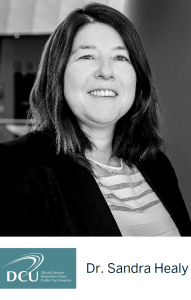
Q: As young women prepare to build their career, how important is internal dialogue and asking for help to overcome challenges?
The quality of your life is the quality of the conversation in your head. Push through the doubts, believe in yourself and be outstanding!
I would also encourage people to think about mentorship and sponsorship. If you are new to an organisation or the minority in the room, reach out and begin to build a network. Ask for help, do it early and build on this throughout your career by adding to your internal and external networks.
People love to be asked for help and finding a mentor or coach early on in your career will help build confidence, bring clarity to your internal dialogue and challenge your thinking.
Wider thoughts of the HPC Team
We asked our team of Facilitators, Executive and Team Coaches what important questions leaders should be asking themselves as they embrace and embed diversity throughout their organisation:
